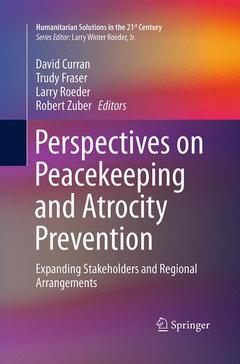Perspectives on Peacekeeping and Atrocity Prevention, Softcover reprint of the original 1st ed. 2015 Expanding Stakeholders and Regional Arrangements Humanitarian Solutions in the 21st Century Series

The current challenges and potential future of peacekeeping in an increasingly complex world take center stage in this far-reaching collection.
Contributors advance a nuanced picture of post-conflict environments across different areas of the globe while considering possible deployments of peacekeeping, traditional military and UN forces in semi-autonomous complementary roles. Longstanding debate topics such as the need for a standing UN army and the field implementation of global right-to-protect concepts are discussed, as are emerging ideas in civilian protection, atrocity prevention and balancing triage operations with long-term peacebuilding efforts. Other dispatches chronicle key issues and concerns regarding peacekeeping operations in Brazil, China and diverse regions of Africa.
Included in the coverage:
- Protecting strangers: reflections on a cosmopolitan peacekeeping capacity.
- Towards a standing UN force for peacekeeping.
- Challenges posed by intervention brigades and other coercive measures in support of the protection of civilians.
- Addressing the criminal accountability of peacekeepers.
- The evolution of China?s role in peacekeeping and atrocity crime prevention.
- Businesses and investors as stakeholders in atrocity crime prevention.
Multiple viewpoints, a global scope and real-world clarity make Perspectives on Peacekeeping and Atrocity Prevention an invaluable resource toadvance the work of humanitarians, criminologists and students of and professionals in international relations.
"This collection of articles effectively points to the challenges, complexities and sensitivities of preventing and halting mass atrocity crimes in part through the use of UN peacekeeping operations. The volume also inspires further efforts, including the integration of new and younger stakeholders, to mitigate massive human rights
crimes and fully implement the Responsibility to Protect."Dr. György Tatár
Chair, Budapest Centre for the International Prevention of Genocide and Mass Atrocities
?In a refreshing and engaging manner, this edited volume represents a much-needed contribution to the debate on how best to address current security threats given the limitations and the possibilities of peacekeeping and atrocity prevention. A compelling feature of the book is its exploration of often-neglected stakeholder perspectives alongside first-hand knowledge of the UN system and astute academic observations of key peacekeeping concepts, mandates and practices. Each chapter?s concluding recommendations invite scholars and policy makers to critically interrogate their own beliefs, assumptions and preferred solutions for keeping the peace and preventing mass atrocity violence.?
Dr. Maria Stern
Professor in Peace and Development Studies, School of Global Studies
University of Gothenburg
Introduction to the Boon: Evolving Challenges and Alternative Perspectives to Peacekeeping in Complex Security Environments.- Protecting Strangers: Reflections on a Cosmopolitan Peacekeeping Capacity.- Towards a Standing UN Force for Peacekeeping, by David Curran.- Norm Entrepreneurs Advocating the Responsibility to Protect, and Peacekeeping Reform Proposals.- Peacekeeping and the Rule of Law: Challenges Posed by Intervention Brigades and Other Coercive Measures in Support of the Protection of Civilians.- Addressing the Criminal Accountability of Peacekeepers.- Intersected and Complementary Obstacles and Opportunities in Peacekeeping Operations, Atrocity Crime Prevention, and Related Security Responsibilities.- The Evolution of China’s Role in Peacekeeping and Atrocity Crime Prevention.- The Protection of Civilians in African Regional and Sub-regional Peace Operations.- Regional Implementation of Peacekeeping: Notes and Lessons from the Brazilian experience in the MINUSTAH.- Businesses and Investors as Stakeholders in Atrocity Crime Prevention.- Conclusion.- Appendix: Biographies of Editors and Authors.
David Curran, PhD, is a Research Fellow at the Centre for Trust, Peace and Social Relations, Coventry University. His primary research interest is in developments in United Nations (UN) peacekeeping. Since completing his PhD at the Department of Peace Studies, University of Bradford, David has undertaken research into a range of topic areas including the role of conflict resolution in training programs for military peacekeepers; the Protection of Civilians in UN Peacekeeping; the evolution of rapid-reaction peacekeeping and peacebuilding forces such as the African Union standby brigades, EU battle groups; and the potential of specialized UN rapid reaction capabilities.
Trudy Fraser, PhD, was most recently a Postdoctoral Research Fellow with joint affiliation at the United Nations University (UNU) in Tokyo, Japan, and the University of Tokyo. Her work examines the efficacy of the United Nations in meeting the challenges of contemporary human security. She is the author of Maintaining Peace and Security? The United Nations in a Changing World (Palgrave Macmillan 2014) and the co-editor of The Security Council as Global Legislator with Vesselin Popovski (Routledge 2014). She received a PhD in international relations from the University of St Andrews in Scotland, UK, in 2011.
Larry Roeder is a former Policy Adviser on Disaster Management, US Department of State, working on both conflicts and natural disasters. He was also a multilateral negotiator on national security technologies and a professional peacekeeper, serving as a Civilian Observer in the Multinational Forces and Observers (MFO), Sinai, Egypt. In addition, he served as Executive Director of the Global Disaster Information Network (a project of Vice President Gore), Senior Editor for Climate Caucus Network and UN Affairs Director, (WSPA) where he focused on the impact of climate and conflict on sustainable development issues as
theHighlights new challenges facing peacekeeping operations
Proposes specific tools to be used at the UN and regional levels to fill some of the gaps that currently exist in peace operations
Offers a unique set of perspectives to governments and the policy community regarding the current system of peacekeeping and atrocity crime prevention
Date de parution : 08-2016
Ouvrage de 190 p.
15.5x23.5 cm
Date de parution : 10-2015
Ouvrage de 190 p.
15.5x23.5 cm



